
ARTIFICIAL ORGANS
Scope & Guideline
Exploring the Intersection of Biomaterials and Medicine.
Introduction
Aims and Scopes
- Mechanical Circulatory Support:
Research on devices such as left ventricular assist devices (LVADs) and total artificial hearts, including their design, functionality, and clinical outcomes. - Organ Preservation Techniques:
Studies focused on methods for preserving organs for transplantation, including machine perfusion technologies and the effects of various preservation solutions. - Biocompatibility and Hemocompatibility:
Investigations into the interactions between artificial devices and biological systems, including studies on blood compatibility and the prevention of thrombus formation. - Tissue Engineering and Regenerative Medicine:
Research on the development of engineered tissues and organs, including 3D bioprinting and the use of stem cells for organ regeneration. - Clinical Outcomes and Patient Care:
Evaluations of clinical practices, patient outcomes, and quality of life for patients receiving artificial organ support, with an emphasis on psychological and physical rehabilitation. - Innovative Technologies in Artificial Organs:
Exploration of new technologies and methodologies for the creation and optimization of artificial organs, including computational modeling and advanced materials.
Trending and Emerging
- Artificial Intelligence and Machine Learning:
There is a growing trend towards integrating AI and machine learning in the design and operation of artificial organs, optimizing performance and patient outcomes. - Wearable and Portable Artificial Organs:
Research on the development of wearable devices, such as artificial kidneys and insulin delivery systems, is gaining traction, reflecting a shift towards more patient-friendly solutions. - Personalized Medicine Approaches:
Increasing focus on tailoring artificial organ technologies to individual patient needs, including customized designs and treatment protocols, is emerging as a key area of interest. - Multisystem Organ Support Technologies:
Research that examines the synergy between different organ support systems, such as combining mechanical circulatory support with renal or respiratory support, is on the rise. - Regenerative Strategies and Biomaterials:
Innovations in biomaterials and regenerative medicine, including the development of scaffolds and extracellular matrices for tissue engineering, are becoming central themes in the journal.
Declining or Waning
- Traditional Hemodialysis Techniques:
Research on conventional hemodialysis methods appears to be declining as innovative dialysis technologies and alternatives gain prominence. - Basic Biomechanical Studies:
Studies that focus solely on the basic biomechanics of artificial organs without integrating clinical applications or advanced engineering techniques are becoming less prevalent. - Single-Organ Studies:
Research that focuses exclusively on individual organ systems without considering the interconnectedness of multi-organ support systems is waning. - Historical Perspectives on Artificial Organs:
While historical analyses provided valuable insights, there is less emphasis on retrospective reviews as the focus shifts toward current advancements and future directions. - Animal Models in Preclinical Research:
The reliance on traditional animal models for testing and validation is decreasing, with a growing preference for in vitro and computational models.
Similar Journals
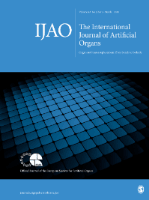
INTERNATIONAL JOURNAL OF ARTIFICIAL ORGANS
Advancing the Future of Organ Replacement.International Journal of Artificial Organs is a prestigious peer-reviewed journal published by SAGE Publications Ltd, dedicated to advancing the field of bioengineering, biomaterials, and biomedical engineering. Established in 1978, the journal has a rich history of contributing to the research community with cutting-edge studies and advancements in artificial organ technology and related disciplines. With an impact factor that positions it in the Q3 category across multiple fields, including Medicine and Engineering, the journal serves as a vital resource for researchers, professionals, and students interested in innovative solutions for organ replacement and support. While it is not an open-access journal, it offers subscription-based access, ensuring the dissemination of high-quality research to stakeholders globally. Located in Italy, the journal’s scope encompasses a variety of disciplines, making it essential reading for those at the forefront of medical technology development. Explore the latest breakthroughs and join a community committed to transforming lives through science and engineering.
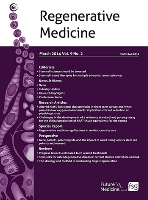
Regenerative Medicine
Connecting Minds for Revolutionary Health SolutionsRegenerative Medicine, published by Taylor & Francis Ltd, is a pivotal journal within the field of biomedical research, focusing on the innovative advances in regenerative and restored functions in human health. With an ISSN of 1746-0751 and an E-ISSN of 1746-076X, this esteemed journal boasts a commendable impact factor within its categories, notably holding the Q2 status in Embryology and Q3 in Biomedical Engineering as of 2023. Covering a broad spectrum of topics from stem cell research to tissue engineering, it serves as a crucial platform for interdisciplinary collaboration among researchers, professionals, and students dedicated to the regeneration of tissues and organs. Given its comprehensive scope from 2006 to 2024, the journal continues to attract high-quality manuscripts that advance the frontiers of knowledge in regenerative medicine. Researchers and practitioners alike are encouraged to engage with the latest findings and methodologies disseminated in this vital publication.
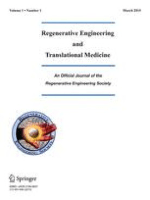
Regenerative Engineering and Translational Medicine
Unveiling New Horizons in Cell Biology and EngineeringRegenerative Engineering and Translational Medicine is an esteemed academic journal published by Springer Heidelberg, focusing on the interdisciplinary fields of biomaterials, biomedical engineering, and cell biology. With an ISSN of 2364-4133 and an E-ISSN of 2364-4141, the journal has carved a niche for itself since its inception in 2015, showcasing cutting-edge research that bridges the gap between scientific findings and practical applications in regenerative medicine. As a recognized platform in its field, it is currently positioned within Q3 quartiles in biomaterials, biomedical engineering, and medicine (miscellaneous), with a Scopus ranking that reflects its growing influence among peers. The journal aims to disseminate high-quality, peer-reviewed articles that highlight advancements in regenerative engineering, further advancing both theoretical and applied research. Scholars and practitioners seeking to stay at the forefront of the ever-evolving landscape of regenerative health solutions will find invaluable insights and innovations within these pages. Join a community of leading thinkers and explore the journal's comprehensive research contributions, which are crucial for fostering partnerships between academia and industry in the quest for transformative medical solutions.
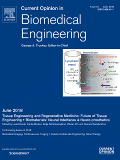
Current Opinion in Biomedical Engineering
Connecting experts for innovative biomedical solutions.Current Opinion in Biomedical Engineering is a renowned journal published by Elsevier, focusing on the cutting-edge developments and critical assessments in the fields of biomedical engineering and related disciplines. With an ISSN of 2468-4511, it provides a valuable platform for researchers and professionals to disseminate their insights and discoveries in areas such as bioengineering, biomaterials, and medicine. Its impressive impact factor positions it in the Q2 category for several fields, including Bioengineering and Biomedical Engineering, highlighting its influence and relevance in ongoing scientific dialogues. The journal’s unique format of opinion pieces and reviews encourages innovative thinking and fosters collaboration among experts. As an essential resource for those engaged in the life sciences and engineering, Current Opinion in Biomedical Engineering serves to stimulate discussion, promote knowledge exchange, and drive advancements in biomedical applications. Set in the Netherlands at Radarweg 29, 1043 NX Amsterdam, the journal is accessible through various academic platforms, enabling a global readership to engage with the latest scholarly work in this dynamic field.

Biomedical Engineering Online
Bridging the gap between engineering excellence and medical advancements.Biomedical Engineering Online, published by BMC, is an esteemed open-access journal in the United Kingdom that has been advancing the field of biomedical engineering since its inception in 2002. With a commitment to disseminating high-quality research, the journal encompasses a broad scope, including innovative studies in biomaterials, imaging technologies, and medical applications. Recognized within the Q2 quartile for various categories such as Biomaterials and Biomedical Engineering, it ranks favorably among its peers: Rank #58 out of 333 in Radiology, and Rank #15 out of 63 in Radiological and Ultrasound Technology in the Scopus database. These rankings, coupled with an open-access model, ensure that critical advancements in medical technology are accessible to researchers, health professionals, and students globally. As it continues through its converged years from 2002 to 2024, Biomedical Engineering Online remains an invaluable resource for anyone involved in the cutting-edge intersection of engineering and medicine.

Stem Cells and Cloning-Advances and Applications
Exploring the Future of Cellular BiologyStem Cells and Cloning-Advances and Applications is a leading peer-reviewed journal dedicated to the dynamic fields of stem cell research and cloning technologies. Published by DOVE MEDICAL PRESS LTD in New Zealand since 2008, this Open Access journal ensures that groundbreaking findings are accessible to a global audience. With a focus on innovative applications and advancements in cellular biology, the journal plays a pivotal role in disseminating knowledge within the scientific community. The journal currently holds an impact factor that reflects its influence, with notable rankings in both Cell Biology and Medicine (Miscellaneous), showcasing its interdisciplinary relevance. Researchers, professionals, and students alike benefit from the journal’s wide-ranging contributions, covering critical topics from regenerative medicine to genetic research. With a commitment to fostering collaboration and encouraging discussion in these cutting-edge domains, Stem Cells and Cloning-Advances and Applications continues to be a vital resource for advancing scientific inquiry and application.

ANNALS OF BIOMEDICAL ENGINEERING
Exploring the future of medical technology.ANNALS OF BIOMEDICAL ENGINEERING is a premier journal in the field of biomedical engineering, published by Springer. Established in 1972, this journal has become a vital resource for researchers, professionals, and students engaged in the rapidly evolving domain of biomedical technology. With a commendable impact factor and ranked in the 76th percentile among its peers as per Scopus, it exemplifies excellence in disseminating critical research findings. The journal covers a broad scope of topics related to the integration of engineering principles with medical and biological sciences, facilitating innovations that enhance healthcare outcomes. Although open access is not offered in this journal, it remains an essential platform for scholarly communication, contributing to the continuous advancement of knowledge in biomedical engineering. ANNALS OF BIOMEDICAL ENGINEERING is not only a bridge for academics to share groundbreaking research but also an influential guide for practical applications in medicine and health technologies, making it a fundamental publication for its readership.
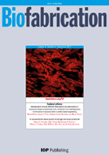
Biofabrication
Pioneering New Frontiers in Biochemistry and Engineering.Biofabrication, published by IOP Publishing Ltd, stands at the forefront of the interdisciplinary fields of biochemistry, bioengineering, biomaterials, biomedical engineering, biotechnology, and miscellaneous medicine. Since its inception in 2009, this prestigious journal has secured its position within the Q1 category across multiple disciplines as of 2023, reflecting its high impact and significant contribution to advancing research in these domains. With ranks such as #19 in biochemistry and #10 in biomaterials according to Scopus, it showcases groundbreaking studies and innovative methodologies that are crucial for the evolution of biofabrication technologies. Authored by leading researchers and professionals, the journal publishes articles that explore the synthesis, characterization, and application of biomaterials, providing valuable insights for both academic researchers and industry practitioners. The impact factor of the journal, combined with its rigorous peer-review process, guarantees high-quality content that pushes the boundaries of knowledge and technology. Researchers and students engaged in these dynamic fields will find Biofabrication an indispensable resource for staying abreast of critical developments and emerging trends.

Bioengineering & Translational Medicine
Connecting Science and Medicine for Impactful OutcomesBioengineering & Translational Medicine, published by WILEY, positions itself at the forefront of innovation in the fields of biomedical engineering, biotechnology, and pharmaceutical science. With an impressive impact factor reflected through its top-tier Q1 rankings in multiple categories, the journal serves as a critical platform for disseminating cutting-edge research and stimulating discourse among professionals and scholars since its establishment as an open-access journal in 2016. Key to its mission is facilitating the translation of bioengineering research into tangible medical applications, thereby enhancing healthcare outcomes. With its comprehensive scope, it attracts a diverse readership, including researchers, industry leaders, and students eager to engage with the latest developments in translational medicine. The journal operates under robust access options, ensuring that research is freely available for maximum reach and impact, fostering collaboration and innovation across disciplines worldwide.

Biomaterials Advances
Connecting Researchers to the Cutting Edge of BiomaterialsBiomaterials Advances is a premier journal published by Elsevier, dedicated to the rapidly evolving field of biomaterials. Established in the United Kingdom, this open-access journal aims to disseminate high-quality, peer-reviewed research that explores innovative biomaterial designs and their applications in bioengineering and biomedical engineering. With an impressive 2023 impact factor reflected in its Q1 rankings across multiple categories—including Bioengineering, Biomaterials, and Biomedical Engineering—Biomaterials Advances stands out as a critical platform for scholars and practitioners faced with advancing technologies and methodologies in the realm of materials science. Covering a broad range of topics, from biocompatibility to tissue engineering, this journal provides an inclusive forum for researchers seeking to contribute to the field. Its Scopus rankings further affirm its position as a leading resource, with notable standings in Biomedical Engineering (Rank #13), Biomaterials (Rank #8), and Bioengineering (Rank #11), all within the top percentiles. Researchers and students alike are encouraged to contribute and engage with the latest findings and innovations in biomaterials through this valuable publication.